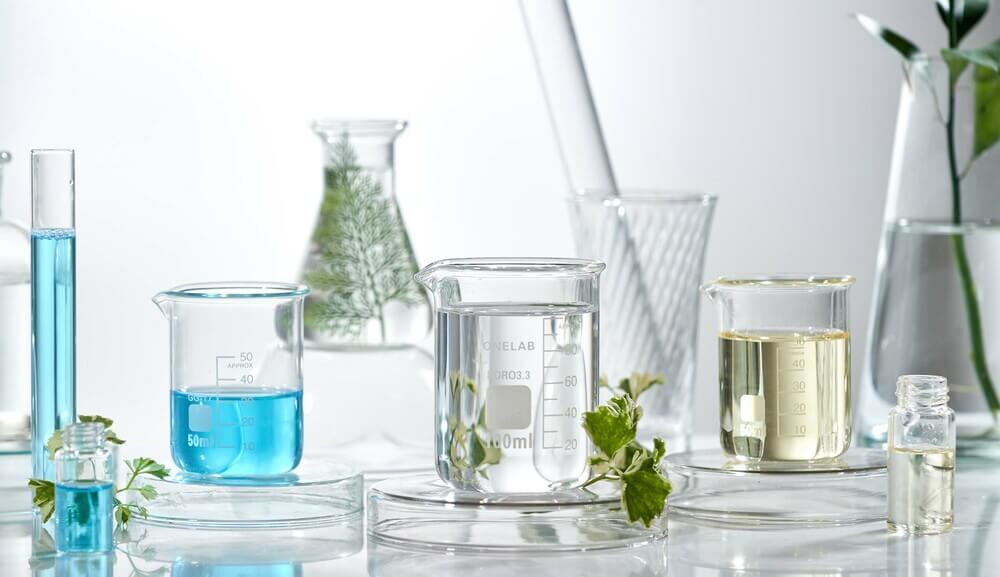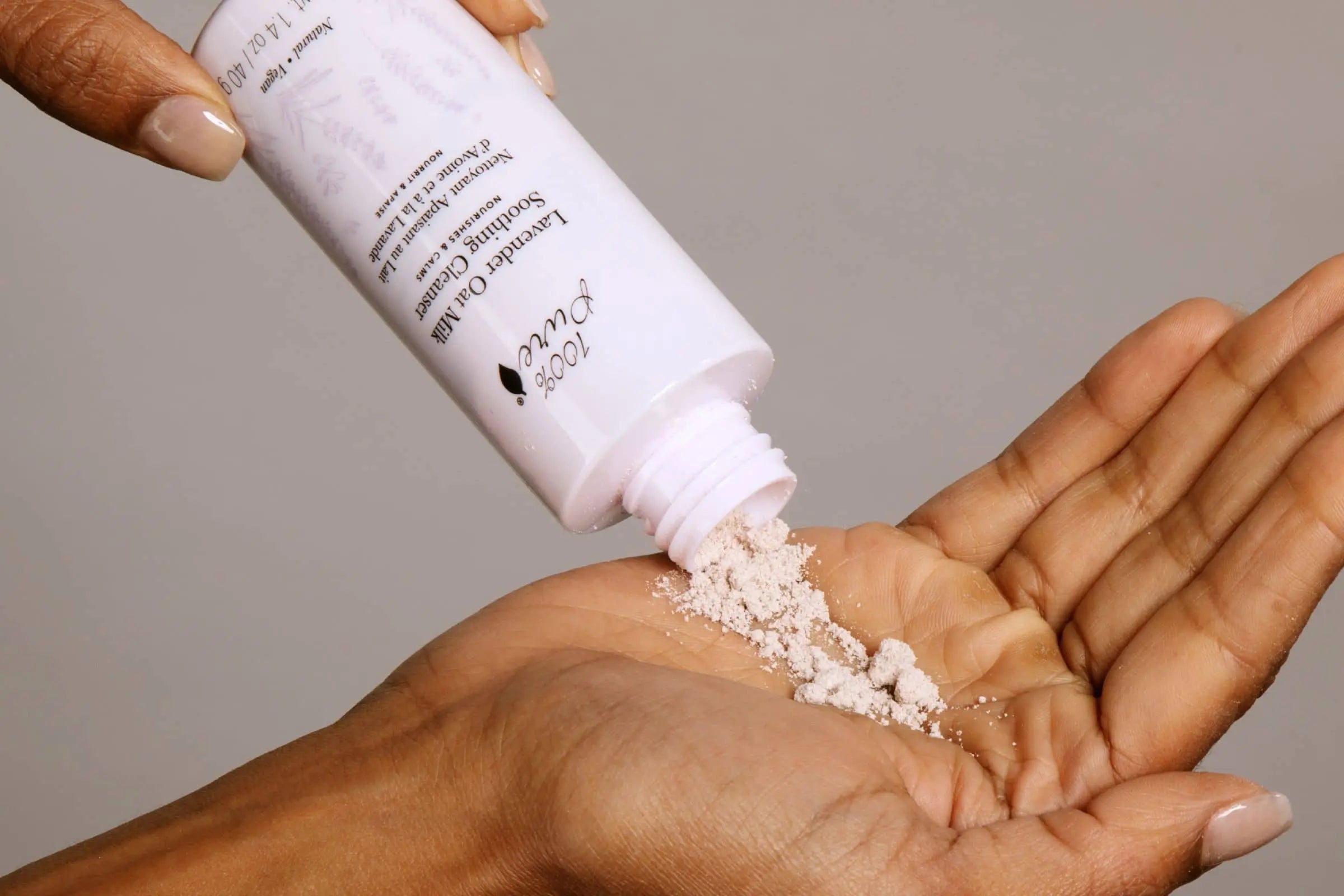Our guide to determining triggers for sensitive skin
Posted on June 22, 2024 Written by: 100% PURE ®

No skin type throws a temper tantrum quite like sensitive skin. If you have this skin type, you’re well aware of the vast emotional and environmental factors that can affect it – let alone harsh skin care ingredients. But at any given time during our lives, many of us wonder, “why is my skin so sensitive?”
While the causes of sensitive skin can be endless, the solution to stopping most of these reactions is simple: avoid irritants. We’ll review factors that trigger sensitive skin, and the most problematic ingredients you’ll want to avoid if you have this skin type.
If you’re a seasoned sensitive skin veteran, your question may not be “why is my skin so sensitive?” but rather, “what doesn’t cause sensitive skin?” That might be a fair assessment, as there are common culprits that can trigger a reaction.
Sensitive skin reacts when nerve endings in the top layer of skin become irritated. This occurs because your skin’s natural barrier is weakened or broken, due to a trigger or underlying condition.
You may have sensitive skin if:
Your Skin Is Reactive
Your senses may be saying yes to that exfoliating cocoa bean cleanser that takes you to a tropical paradise, but your skin could be saying no. If you have sensitive skin, you probably notice that detergents, dyes, exfoliants, and fragrances cause your skin to react. You may notice that they can cause itchiness, dryness, or redness.
You Notice Redness
Most people with sensitive skin deal with some amount of . This can take the form of a red rash, red bumps, blushing and flushing, or red dilated blood vessels. You may also notice redness appearing shortly after applying gentle pressure to the skin.
Your Skin Is Triggered By Environmental Factors
Stepping outside can seem like a minefield when you have sensitive skin. Varying elements such as heat, cold, and wind can aggravate your skin. In addition, cold weather can dry out skin, leaving sensitive skin prone to and .
You Have an Underlying Condition
Heightened skin sensitivity could be due to conditions such as eczema, contact dermatitis, or psoriasis. If you’re having consistent symptoms or discomfort, you should definitely consult a dermatologist for a proper diagnosis.
You Sunburn Easily
Sensitive skin is more susceptible to the harmful effects of the sun. If your skin is already irritated or peeling, you are at an even higher risk of and angrier skin.

Sensitive skin can seem like you’re wandering daily through a minefield, having to be cautious of everything around you. But there are some problematic chemical and natural ingredients that are common top offenders.
#1: Alcohol
Not that kind of celebratory alcohol, but denatured alcohol or . It will sap your skin’s moisture levels, leading to irritation and itchy, uncomfortable skin.
There are some friendlier alcohols known as fatty alcohols that are non-irritating and less sensitizing to skin. You’ll still want to exercise caution when using those.
#2: Fragrance
Synthetic fragrances have a long rap sheet of harsh reactions like redness and rashes. In fact, these smelly culprits are a common cause of allergic reactions. Opt for fragrance-free formulas.
#3: Chemical Sunscreen Ingredients
While common sunscreen ingredients like avobenzone, octocrylene, and oxybenzone don’t usually pose a threat to normal skin, these chemicals can make sensitive skin angry. Try a physical or mineral formula.
#4: Walnut Shell/Granules
You know those tiny particles in your favorite scrub or exfoliant? Their irregular shape may make them too harsh for sensitive skin. Save them for your rough heels and opt for a gentle peel for your face.
#5: Sulfates
Sulfates are used in products to give them a rich foam or lather. Sodium lauryl sulfate (SLS) and ammonium lauryl sulfate (ALS) are the most common chemical latherers. These foaming foes can irritate the skin, leaving it stripped and inflamed. No thanks!
#6: Peppermint Essential Oil Or Menthol
Due to its strong analgesic properties of menthol, peppermint essential oil is best used as an accompaniment, to enhance the effectiveness of other essential or carrier oils. It’s best for people with sensitive skin types to only use this one in breath mints.
#7: Certain Dyes Or Colorants
Formulas with pretty colors might seem attractive. However, these dyes or colorants are often made of coal tar, petroleum, or heavy metals. They can lead to irritation, blocked pores, inflammation, and sensitive skin. Stick to natural or colorants.
#8: Too Much Salicylic Acid
Salicylic acid is great for clearing acne and clogged pores. But in high concentrations, it’s too drying and irritating for sensitive skin. Use sparingly.
#9: PEGs
PEGs or polyethylene glycols are compounds that are used in formulas as thickeners and softeners. They can cause irritation, reduce the skin’s moisture levels, and speed up skin aging!
#10: Parabens
Parabens are a low-cost synthetic preservative used to keep products free from the growth of bacteria and fungus. The problem is, parabens have been linked to allergic reactions among a host of other .
If you have sensitive skin and are unaware of what ingredient or product is causing it, patch test before use. Patch testing is ideal as both prevention and a solution for deciphering skin irritants.
However, many of us have no clue exactly what a patch test is or how to do it. You’re in luck. We’ll tell you everything you need to know about the process.
Step 1:
Choose an accessible patch of skin like the back of your hand or forearm. Ideally, it should be somewhere that you can comfortably leave alone for at least 24 hours.
Step 2:
Wash and clean the patch of skin you’re going to use first. You want to ensure that it’s the new product you applied and not something else causing any reaction.
Step 3:
Apply a dime-sized amount of product to the patch of skin you’ve chosen. Then, wait about 24 to 48 hours.
Step 4:
After the allocated time frame, if you have redness, swelling, itching, or burning, don’t use that product.

100% PURE Skincare Routine for Sensitive Skin
When incorporating new skincare products for sensitive skin, start with a basic routine. Gradually introduce one product at a time, allowing your skin to adjust and observe its effects. Check out our top skincare products to help soothe and calm sensitive skin!
This skin-softening powder cleanser relieves sensitivity, moisturizes, and provides comfort to sensitive skin. It gently washes away makeup, sunblock, and environmental impurities. This nourishing cleanser is made with beta glucan-rich colloidal oatmeal, soothing rose petals, deeply purifying lavender, moisturizing coconut milk, restorative Echinacea, and anti-inflammatory botanicals like chrysanthemum, calendula, and chamomile.
Go beyond your average rose water mist with a super-boosted formula featuring hyaluronic acid, aloe vera, and white tea. With its aromatic rose fragrance, this face mist offers additional support to reduce redness and condition the skin, while delivering a double dose of hydration to quench dry, dehydrated skin and boost the skin’s glow.
This lightweight moisturizer with a fast-absorbing formula is made with rose water, chia seed gel, nopal cactus, and hyaluronic acid to provide quenching, and skin-plumping hydration. Chia water and chia oil plump, firm, and fortify skin with omega fatty acids. Sodium PCA and coconut oil act as humectants to retain hydration in the skin from the other natural ingredients in the formula, resulting in a more moisturized complexion.
This lightweight mist is made with nourishing yerba mate, which is chock-full of antioxidants for protection against free radical damage and the signs of premature aging. This reef-safe natural sunscreen spray has an application that’s easy to apply on the fly, and we use a compressed air canister built into the bottle to eject the formula, instead of ozone-harming CFCs.
This concentrated all-natural face exfoliator is designed to give pores a deep sweep for a glowing, more youthful complexion. Crushed organic acai berries deeply nourish and brighten with essential vitamins, minerals, antioxidants, fatty acids, and vitamins A and C.
Not all ingredients on this list will guarantee a reaction, but they can be more irritating than others. If you find yourself asking, “why is my skin so sensitive?” then be sure to patch test, and pay attention to when your skin is more reactive. Those circumstances may include extreme heat or cold, menstruation, menopause, or pregnancy. Get to know these sensitive-skin no-no’s so you can avoid possible triggers and maintain , .
Frequently Asked Questions About Sensitive Skin
What are the top ingredients to avoid if you have sensitive skin?
If you have sensitive skin, you should avoid fragrances, drying alcohols, sulfates, parabens, preservatives, and harsh exfoliants.
Why should people with sensitive skin avoid synthetic fragrances?
Fragrances, especially synthetic fragrances, can negatively impact the skin health of people with sensitive skin. Fragrances can cause skin sensitization, allergic reactions, and irritation, which can lead to inflammation and a compromised skin barrier. They can also exacerbate conditions like eczema and rosacea.
What are the alternatives to chemical sunscreens for sensitive skin?
If you have sensitive skin, opt for mineral sunscreens that contain zinc oxide or titanium dioxide, since they’re generally less irritating to the skin and don’t cause adverse reactions.
Can too much salicylic acid harm sensitive skin?
Although salicylic acid is considered safe overall, it may cause skin irritation when first starting, especially if you have sensitive skin. It may also remove too much oil, resulting in dryness and potential irritation. Other potential side effects include skin tingling or stinging.
What are PEGs and why should they be avoided in skincare for sensitive skin?
Polyethylene glycols (PEGs) are synthetic petroleum-based compounds that are often used in skincare as thickeners, solvents, softeners, and moisture carriers. They can also help other ingredients, including harmful ones, absorb into the skin. However, PEGs should be avoided in skincare for sensitive skin.




